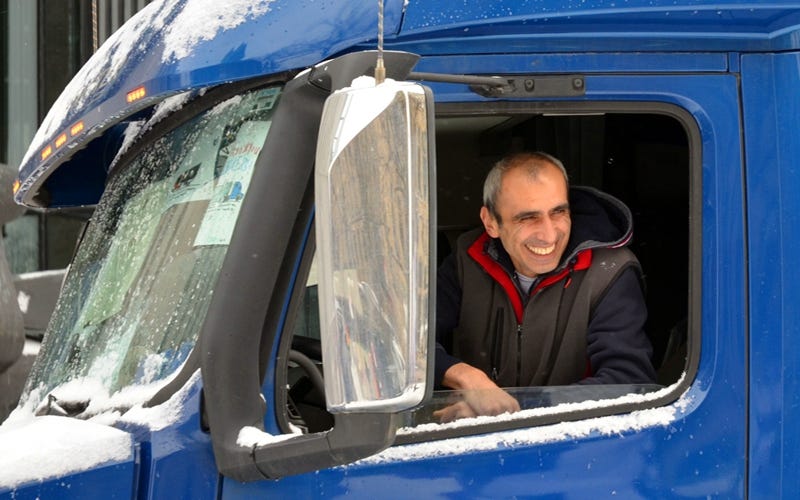I Thought I Was Living in the Best Country (Part 1 of 4)
Employment & good health go together. Yet health officials robbed people of their livelihoods.
Ed arrived in Canada in 2002, at the tender age of twenty-two. Since then, he has hauled cargo through every province in the land. “I drove from Atlantic to Pacific,” he says. “Vancouver Island, Newfoundland, ferries from both sides.
Born behind the Iron Curtain in what was then Soviet Armenia, a tiny nation of three million Christians with Turkey to the west and Iran to the south, he says “I appreciate Canada so much. I love this country, honestly. I thought I was living in the best country.”
It's August of 2022 - six months after the end of the Freedom Convoy. Our video interview takes place early in the morning. Ed's already in his truck, parked near Toronto. “I drive to New York," he says. "Nobody drives to New York because it’s scary, it’s tough, it’s narrow.” Ed hauls reefers of perishable food, dry goods, and recyclables. Toronto to NYC one day, NYC to Toronto the next. Two round trips per week. It used to be three.
Crossing the Canada/US border is part of his normal workday. During the earliest pandemic months in which much of the population stayed home, his labour kept store shelves stocked and the economy afloat.
A civilized government would have rewarded truckers with, say, a one-time tax credit. Instead, it turned on these heroes. Almost two years after the pandemic began, and many months after the CDC admitted COVID vaccines didn't stop virus transmission, Canada forced those vaccines on cross-border truckers. Any trucker who failed to comply would be required to quarantine for 14 days each time they re-entered the country.
That's how Ed, the hard-working immigrant, learned that medical decisions about his own body weren't his to make. He says he got the first dose along with "most of my friends. And then I was waiting for the second one in two weeks and then I don’t know, it kind of got delayed.”
As the deadline approached, officials were sending mixed messages, suggesting there might be a reprieve. But on January 13th, the government declared that a pause had been erroneously announced the previous day. Public Health Canada would not be relenting. The new rules would still take effect January 15th.
We’ve long known that losing your job is among life’s most stressful experiences. Seven years before Ed arrived in Canada, the Canadian Medical Association published a 12-page article about the strong links “between unemployment and many adverse health outcomes.” A British Medical Journal editor has described the evidence that “unemployment kills” as verging on “the irrefutable.” It is also well understood that job loss is a major cause of family breakdown.
By early 2022, much of the world had endured two years of economic, social, and educational upheaval. For many people, the stress had been immense. Due to COVID protocols, loved ones had died alone in hospitals and care homes. Funerals had been capped at 10 people. Decades-old family businesses had collapsed. Retirement plans had been torpedoed. Alcohol consumption had increased. So had waistlines.
During the third week of January, 40% of Canadian young people (aged 18 to 34) surveyed by a pollster said they were “at a mental health breaking point right now.” Sixty percent were “very worried about the mental health of people in their own family.”
This is the context in which Canada’s Public Health Agency chose to inflict further harm. Officials who were well aware that employment and good health go together imposed policies they knew would cause truckers to lose their jobs.
Ed took the second dose of vaccine on January 8th. But there was a two-week waiting period before the government considered him fully vaccinated. So he joined the Freedom Convoy “instead of sitting at home.” Having left his truck at a garage for maintenance, suddenly he was in a hurry to get it back.
Arriving in Ottawa independently on Friday, January 28th, he found a prominent parking spot on Wellington Street near Kent. For three weeks, he and a friend lived and slept in his truck. "It was tight," he says, but "somehow we managed it." It was also frigid. "I never seen such a winter. Three weeks and so cold every single day. So cold."
Each time they required a shower was "some kind of experience, you know, some kind of friendship." A Polish pastor offered them shower access, prepared a meal for them, and took them to his church. "Many people were like that," says Ed. "Even visitors coming from all over Canada." People on the street, greeting him as he sat in his truck, would ask if he needed a shower, and take him back to their hotel room.
next installment: Looking to Leave Canada






It's beyond Important that this info be captured and saved. Already it is almost unbelievable. Thank you again Donna
🙏🏼🇨🇦🙏🏼
Amen to Toby and Meg..